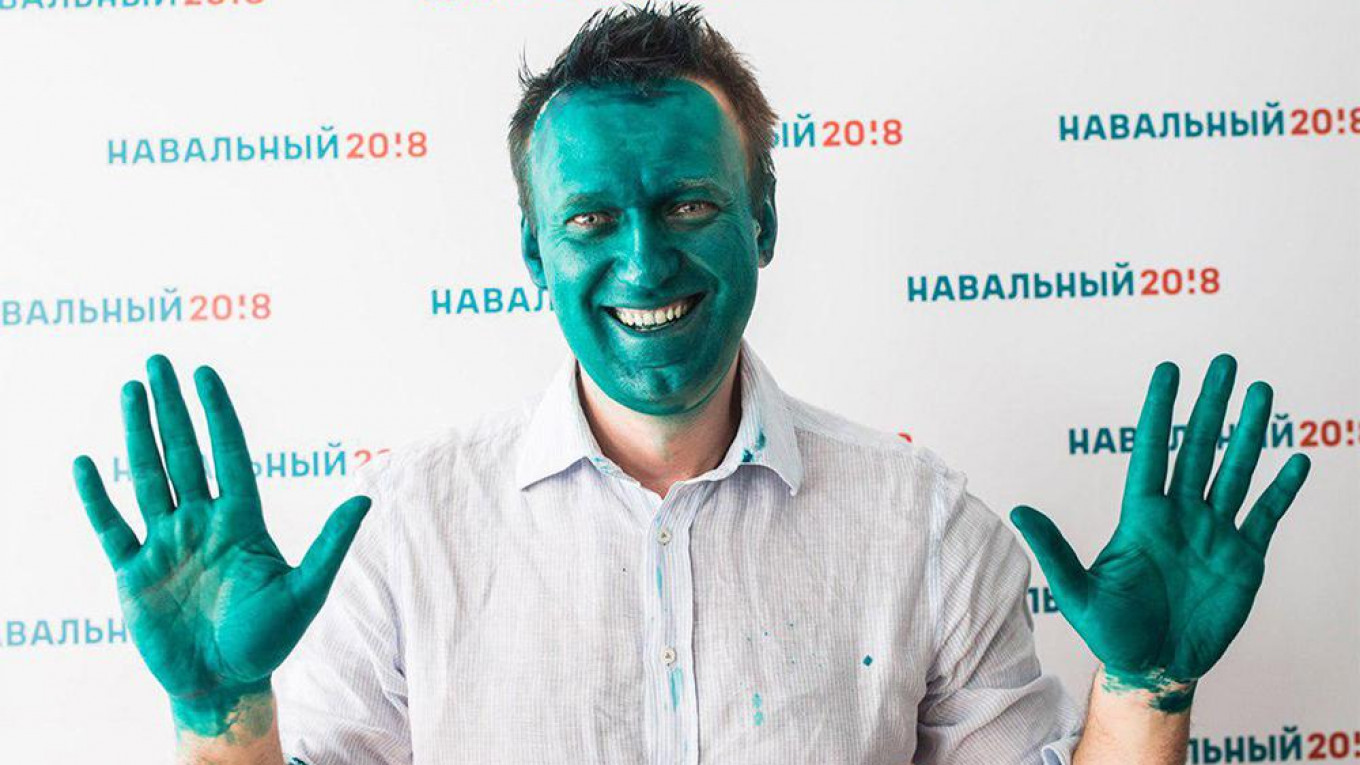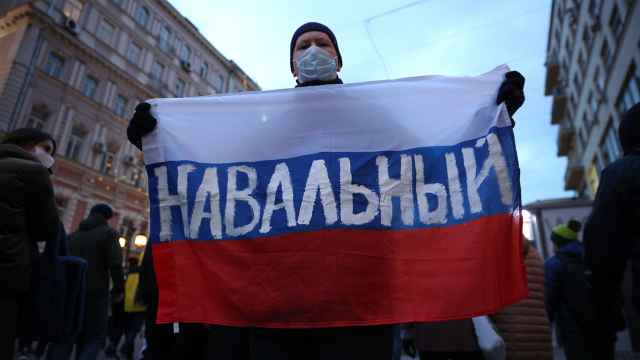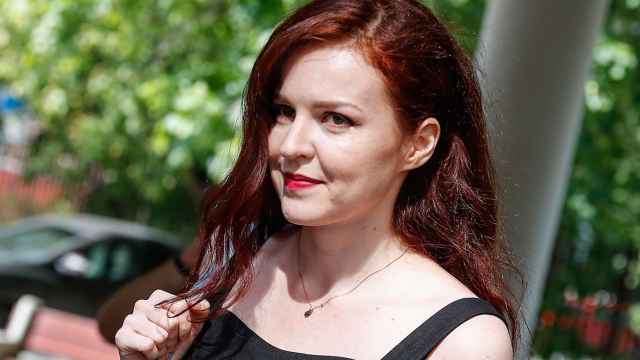In early July, Russian media reported Vladimir Putin’s decision to run as an independent candidate in the 2018 presidential election. The path of an independent candidate is extremely laborious and unpredictable in Russia, requiring them to collect 300,000 signatures throughout the country just to be nominated.
So Russian-language social media broke out in a storm of wisecracks. “Wow! Putin now envies Alexei Navalny: he also wants to be a self-nominated candidate going around collecting signatures. Now we’ve got two whole independent candidates!”
Navalny—Russia’s eternal would-be independent candidate—has certainly been in the spotlight over the last two years. His anti-corruption investigations on YouTube get millions of views while his personal social media accounts compete with the most followed bloggers on Russian-language Facebook and Twitter.
Navalny’s supporters conduct their street protests under the same anti-corruption slogans he uses in his investigations. Young people, who are immune to the blunt propaganda on state television, have turned out to be the most appreciative audience for his blogs and videos.
But even the most optimistic polls give Navalny no more than 2 percent support in the upcoming elections and Putin no less than 63 percent. And anyway, Navalny has two convictions for grave economic crimes, and even though the courts suspended both sentences, he is prohibited from running in elections.
It looks as though there is no real possibility for Alexei Navalny to get his name on the ballot, much less gain solid electoral support.
Nevertheless, for the last several months he has been energetically running an informal electoral campaign with the result that he has acquired political gravity as well.
Navalny’s success can’t be described in the dry numbers of his supporters. What’s far more important is the dynamic of the geographic coverage of his support and his growing influence on Russia’s political situation as a whole. Each step moves him forward, perhaps just a little bit, but the overall distance he has covered over the last five years looks enormous.
A few months before Moscow exploded in protest in 2011, The New Yorker published a detailed profile of Navalny, painting him as a talented muckraker digging up dirt on corrupt Russian officials. At the time it seemed that his career path would be one of a popular blogger, Putin’s eternal public nemesis. But a lot has happened since then.
He first tried to interrupt the decline of street protests in 2013, when he unexpectedly announced his candidacy for Moscow mayor. His chances of avoiding a total loss were viewed as virtually nonexistent. He was running against an incumbent mayor who had the backing of the Kremlin and unlimited financial resources. by contrast, Navalny started with a handful of volunteers and negligible financing. Nonetheless, he collected nearly a third of the votes, and came second. The Kremlin candidate barely escaped a second round of voting, whose outcome would have been far less predictable.
More than the sensational electoral result, Navalny’s biggest political success was the realization that the campaign itself could help a human ecosystem coalesce around a leader. It also became clear that a campaign creates an organizational structure that doesn’t disappear after the votes have been counted.
Moreover, Navalny managed to create a situation in which the Moscow mayoral election would have lost legitimacy without his participation.
Navalny’s campaign today for the unattainable presidency is precisely an attempt to repeat that approach. Like then, today’s campaign is not a battle to succeed in a specific election but an attempt to build an efficient political structure that can survive in the long run.
Under these circumstances, the answer to what Navalny will do if he is not allowed to run—a question that is raised over and over again—is very simple: nothing. The campaign will go on because to engage in the process is far more important than to reach a given vote count.
Clearly, the biggest success for Navalny in this situation is to set the same trap as in 2013 — to have Vladimir Putin face the fact that an election without a real opponent and fierce critic is nothing but a shameful farce.
Navalny skillfully balances atop the conflicting interests and ambitions of the different players in the Kremlin’s ambit. He forces some groups of Russian high-ranking officials and oligarchs competing for power and influence with the Kremlin as well as access to public financing to supply him with new materials for new anti-corruption investigations compromising other clans. He pits law enforcement bodies against the security services, which traditionally compete against one another.
The very fact that no one has ever succeeded at putting him behind bars for long also stems from his adroit balancing act. Apparently, he manages to make those at the Kremlin who make final decisions believe he is easier to manipulate as a free man. In the meantime, he himself calmly goes about his work, as if he has learned to ignore the fact that any day could be his last day of freedom.
Over the last six months, Navalny’s electoral campaign has turned into a massive effort to construct a network of campaign offices across dozens of Russian cities. The stated goal of this activity is to prepare a nucleus of supporters who can mobilize on “D-Day” the collection of the 300,000 signatures required to formally nominate a candidate. But in fact the rationale is still the same: the process of creating an opposition structure has inherent value.
Like then, today’s campaign is not a battle to succeed in a specific election but an attempt to build an efficient political structure that can survive in the long run.
By early June, the number of campaign offices had reached sixty. And each visit of Navalny with his team to a city becomes the main event of that city’s life.
The only thing that the Kremlin and its infinitely loyal regional elites can offer against Navalny’s methodical march across the country is violence and power abuses.
This is why a fierce scandal accompanies the opening of a Navalny campaign office in almost every city. Police and various officials such as tax and fire safety inspectors exert pressure on landlords willing to rent space to the campaign office. They are harassed and beaten up. Campaign headquarters lose electricity or water service. There are arson attempts and demands to evacuate the premises because of a supposed bomb threat. Doors are welded or glued shut, windows broken with stones and bottles, and walls covered with offensive graffiti.
Aggressive groups of pro-government vigilantes never fail to show up at Navalny’s meetings with activists, looking for any excuse to start a fight. Visitors are pelted with eggs, paint, and offensive substances. Navalny was personally attacked at least three times this spring and sustained a serious injury to his eye.
Russian law-enforcement agencies have sent out orders to local railway, airport, and post office administrators all across Russia, directing them to seize under any pretext campaign materials – newspapers and flyers – that Navalny’s local headquarters receive from Moscow.
However, even if all those offices are destroyed, even if the signatures are never collected and the nomination never happens, the infrastructure of Navalny’s movement will never go away.
Twice, Navalny tried to register an official party in early 2014 and was denied. Now he is creating a functional structure without a formal license but with advantages that matter far more—namely, large-scale participation, broad geographic scale, and the real enthusiasm of the participants.
If he succeeds, this structure will be the only oppositional organization of such a scale and compass in Russia. And Navalny will end up with a unique political resource in his hands, one whose value will endure regardless of the 2018 election results.
This enormous work demands remarkable cool-headedness, courage, and an extremely well-finessed and methodical organizational effort on the part of Navalny and his supporters. There likely isn’t a single person left at the Anti-Corruption Fund who hasn’t been interrogated in connection with some absurd, often unstipulated charge, who has not experienced a search or detention; staff have had their offices trashed, their private email hacked, and their laptops and phones confiscated. Navalny himself has been behind bars twice this spring alone.
As the only opposition leader able to achieve real success, Navalny builds relationships with his colleagues in the opposition camp in a pragmatic way. He insists on being the leader. And when he needs to make decisions on his own, even though it means presenting his natural allies with a fait accompli, he does so again and again, earning rebukes for a perceived unwillingness or inability to collaborate.
Commentators increasingly explain this tough managerial style by claiming that Navalny leans toward political authoritarianism. It has become somewhat fashionable to draw similarities between Navalny’s and Putin’s dictatorial manner and to discuss their inner political affinity and even the closeness of their worldviews.
However, just the opposite is true. Indignation over corruption alone won’t help draw universal attention and support. Day after day, Navalny has to hold increasingly more complex conversations with his supporters and undecided voters. He has to search for new stories and topics and reconsider and clarify his own positions. This is all becoming a prerequisite for the further development of his cause.
Navalny is above all a growing politician, one who keeps searching for his true cause and his natural style. He is developing quickly and evolving with ease, learning new things and abandoning ideas that have outlived their usefulness. A couple of years ago it was fashionable to search for and find in him a tendency to flirt with Russian nationalists. Where are those chastisers now?
What distinguishes Alexei Navalny today is that he is alive and awake. He has a keen intuition and is passionately involved in what is happening around him. He has already sacrificed a lot and is ready to sacrifice even more for the right to play what could be a decisive role in this adventure.
In today’s Russian political reality he is like Viktor Shklovsky’s “live silver fox in a fur store” — on the edge of losing his freedom as a person while working tirelessly to construct an oppositional organization that can thrive without him.
..........................................................................................................................................................................................................................................
Sergei Parkhomenko is Russian journalist and publisher. This article was originally published by the Kennan Institute.
The views and opinions expressed in opinion pieces do not necessarily reflect the position of The Moscow Times.
A Message from The Moscow Times:
Dear readers,
We are facing unprecedented challenges. Russia's Prosecutor General's Office has designated The Moscow Times as an "undesirable" organization, criminalizing our work and putting our staff at risk of prosecution. This follows our earlier unjust labeling as a "foreign agent."
These actions are direct attempts to silence independent journalism in Russia. The authorities claim our work "discredits the decisions of the Russian leadership." We see things differently: we strive to provide accurate, unbiased reporting on Russia.
We, the journalists of The Moscow Times, refuse to be silenced. But to continue our work, we need your help.
Your support, no matter how small, makes a world of difference. If you can, please support us monthly starting from just $2. It's quick to set up, and every contribution makes a significant impact.
By supporting The Moscow Times, you're defending open, independent journalism in the face of repression. Thank you for standing with us.
Remind me later.






